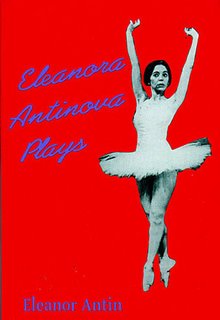Artists Who Write

Art Soldier is ahead of this curve today, with a great post pointing to Martha Rosler. Martha Rosler is exactly the kind of artist I want to talk about. So is Richard Serra. Robert Smithson, Sophie Calle, Eleanor Antin, Donald Judd. Gerhard Richter.
I want to talk about artists who write because this practice is different from pumping out a statement. A statement is a bad format for two reasons. Of course it is stupid to write a statement because it does the viewer's work for them. But there is an insidious side effect to this extra work. To make a statement is to know, and there is nothing more boring than artists who cleave to what they know. Statements set an expectation that the artist is an authority on her own work, and I cannot imagine anything more stultifying, more blinding, than authority.
To begin, here's yesterday's definition of the Statement Format:
The artist's statement as taught in school asks me to tell you what my art means. It answers the questions: What is my art doing? How is it doing it? Why is it doing it?
And just to flesh this out, I would characterize an artist's statement as a helpful document that asks the artist to take the point of view of the viewer, frame the meaning of one's work in a linear, logical format, and pre-emptively answer any questions the viewer might have.
Let's set aside the indignant footstamping--what the fuck is wrong us that this spoonfeeding has become convention--and focus on the cause and effect relationships here. It is easy to see that audiences quickly could become accustomed to just being told what the work means. But what about the artist? Does Joe MFA get accustomed to the expectation that two times a year or so he needs to step outside his practice and assign meaning to the totality of his work as an authority? And if so, what does that do to the work?
The writing artists I mentioned above never positioned themselves like this, and yet they wind up doing all this insightful writing and artmaking. That, I believe, is because there is a real difference between writing as an explorer and writing as an authority. The statement has a point of view problem. Could you imagine Eleanor Antin sitting down to tell us what Eleanora Antinova was about in a half-page statement? No way! The act of walking around New York, pretending you are a black Russian ballerina when in fact you are a smallish Jewish woman with no formal dance training is too absurd, too loaded. It's about too many things, and the way they interact.
And that is why it is good work. Eleanor Antin did not know what would happen when one walks around the city, pretending to be black, a ballerina, and Russian. And so Being Antinova is not authoritative. It is exploratory, and there's its strength.
Similarly, Richard Serra's essay Weight is nothing close to the last word on Serra's work. It's more like a stone thrown on one corner of a tarp on a windy day. Serra's work has a lot to do with weight, but it has even more to do with empty space. Does putting a fine point on weight--defining it, listing examples of it, figuring out when it became so important--help the Serra enterprise? Sure. But it sure as hell does not define it.
Artmaking is a confusing, mucky, non-linear excursion into the unknown, and the artist is charged with bringing something back that affirms our existence and experience--that is at the same time totally unknown and completely of us. Writing can help this enterprise. Writing propelled Robert Smithson into the unknown by recasting his known world (New Jersey) as a new source of mystery. Writing, and the way it slows thoughts down and makes them behave, allowed him to bring that mystery back. He made connections in his writing that make my bones cry out for dirt.
Artists need to be making these deep connections, probing these existential weirdnesses and bringing back strange, affirming artifacts and anecdotes. Artist's statements do more than just don't allow for that exploration. In my own studio, the artist's statement sometimes sits on my shoulder and keeps me from being comfortable with the unknown. And while I cannot speak for any other artist's internal dialogue, much of the reality-based, artist-as-researcher, artist-as-curator, lameass neo-conceptualist twaddle out there reads to my eyes like it already knew where it was going before it began. Why should any artist do the hard work of keeping steady in the realm of the unknown when the artist's statement and its call to authority is lurking in the back of your head?
This is the danger of artistic authority. I don't want to look at anything an artist feels comfortable encapsulating in a half-page authoritative statement that tells me exactly what to make of it, because there is nothing there.

2 Comments:
I think you can add Agnes Martin to that list and perhaps R.B.Kitaj (that is a totally uncool reference btw)
and Bill Viola?
Is the artist blog positioned to replace the statement?
I posted your 8 reasons cooment and added 2 more. Hope that's ok? I got excited and forgot to ask.
Post a Comment
<< Home